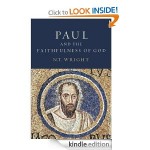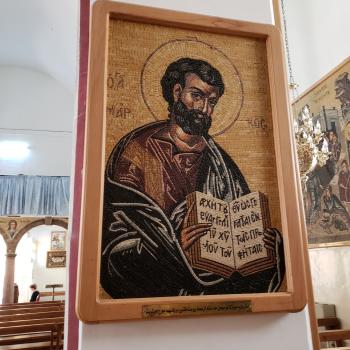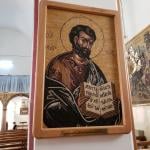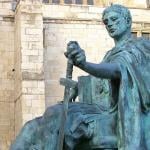Much of chapter five is spent demonstrating the evidence for and growth of the Imperial Cult during the first century A.D. Of this there is no lack of evidence. What we cannot directly tell from the archaeological remains is the effect this specific cult had on the mentality of Jews and Christians living in the Roman Empire. We know of course of the repugnance felt about what Jews and Christians called idolatry of any and all sorts. We also hear the lament of Plutarch that ‘nowadays Olympus is over-crowded’. Yet there is sometimes more specific evidence, like that found in Wis. Sol. 14.17-21 that there was an especial repugnance of the Jews to the worship of a king or an emperor. This is of particular interest to us because of course one would imagine the exact same revulsion when it became clear to non-Christian Jews that a crucified manual worker from Nazareth was being worshipped as well. Jews did not anticipate messiah being worshipped much less a crucified ‘messianic figure’. The question becomes— Is there enough evidence in the remains, and perhaps in the NT to justify the suggestion that Christians were regularly contrasting Jesus with the Emperor, with the latter being the divine reality of which the former was just a parody? Wright, does not yet try to answer the question in regard to the NT in this chapter, but rather is content to build up an impressive picture of the proliferation of the Imperial cult in the eastern and the western Empire. Wright is well aware that the evidence is complex.
For example, on p. 313, Wright cites the study of Price which concludes in part: “The religion of place was now restructured around a person. But it is misleading to categorize this as ‘the imperial cult’. The term arbitrarily separates honours to the emperor from the full range of his religious activities, and it assumes that there was a single institution of his cult throughout the empire.” On the same page in a note it is stressed that there were a series of different cults sharing a common focus in the worship of the emperor, his family, or predecessors, but operating in various ways in various locales (sometimes combined with the cults of other gods like Demeter, sometimes just a special altar, rather than a constructed temple. Price and his colleagues go on to say that Romanization was often more advanced even in its religion by the establishing of Roman colony cities than by the establishment of the imperial cult itself. Wright is content to say that so long as one recognizes that there was no single uniform reality that corresponded to the phrase ‘imperial cult’ it is still an important factor to consider in evaluating the NT. This is a more nuanced view than in some of his previous writings. The challenge, in my view is to get the balance right, between too much minimizing of the impact of the pluriform imperial cult and too much hyperbole about its effect on NT writers. Were these writers really often or always looking over their shoulders and writing over against the imperial cult? I would say they sometimes seem to have been doing this, but not as extensively as most of the enthusiasts for this approach to the NT have suggested (see again the volume mentioned in the previous note by McKnight and Modica). I will give one example. It is not an easy thing to decide when a phrase like ‘the ruler/rulers’ of this world’ refers to Caesar and/or other human figures and when it refers to Satan and his minions. Sometimes it seem more likely to be the former (see e.g. 1 Cor. 2.6-8 where we hear about rulers that crucified Jesus), sometimes more likely to be the latter (Col. 1.16ff. where names used for ranks of angels appear, and seem to refer to heavenly beings). And then too, one can make a case for the Satanic influence on human institutions, indeed on the Emperor himself (see e.g. MR. 666 in Revelation). On the whole however, when one reads a text like Ephes. 6.10ff. it seems clear that the major emphasis is that Christians are not mainly busy fighting off the Emperor cult devotees or idea or the Roman Empire, but rather the powers of darkness and the kingdom of night. The narrative in the NT is more like the Lord of the Rings, and less like a movie about Caligula. I think that Tom has made as strong a case as can be made for a strong influence of the rising tide of Imperial cult across the Empire, the question still remains the degree to which the NT is a response of counter volley to that rising tide. One can see for example, how a bad emperor, a crazy emperor, a persecuting emperor like Nero or Domitian or Caligula might well call for even a written, if veiled response from Christians, and they did so. I think we do see this for example in 2 Thess. 2 or Revelation, and a few other places. And as Tom points out…. “The discourse of imperial cults was committed to preventing the imagination from imagining the end of the world” (Quoting S.Friesen). To which Tom adds “No declared Paul: God has fixed a day on which he will have the world brought to justice” (p. 342). In other words, imperial eschatology would be a target for critique, and not just imperial cult writ large. Yet Christians absolutely did not go in for the sort of violent response to Rome that we find in the two Jewish revolts in A.D. 66 and again in the second century with Bar Kokba. This could partly be attributed to imbibing Jesus’s ethic of non-violence (see Matt. 5-7 and comp. Rom. 12-13), but there is something else at work as well. Christians saw the real enemy as not made of flesh and blood, but rather as spiritual forces, including ‘the prince of the power of the air’. This is why despite troubles from human officials, we still have texts like Rom. 13, or sayings like pray for kings and rulers and honor the Emperor in 1 Peter.
Tom has now completed his survey of context, and will finally turn to Paul more directly. We will begin the analysis of that in the next post.


















